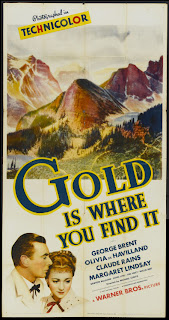
Horizons West (1952)
Director: Budd Boetticher. Screenwriter: Louis Stevens. Director of Photography: Charles P. Boyle. Producer: Albert J. Cohen. Music: Henry Mancini, Herman Stein. Actors: Robert Ryan (Dan Hammond), Rock Hudson (Neil Hammond), James Arness (Tiny McGilligan), Raymond Burr (Cord Hardin), Julie Adams (Lorna Hardin), Judith Braun (Sally Eaton). Universal. 81 mins.
Horizons West is emblematic of the anti-traditionalist direction that director, Budd Boetticher, would take the Western genre. The film is bursting with energy and ideas, much of which winds up feeling rushed, displaced, or pre-mature in its execution due to the film's brief runtime. At 81 minutes, it's far too short for its ambitions. Nonetheless, it is a flawed but fascinating Western that exemplifies the personal vision of Boetticher.
Robert Ryan, Rock Hudson, and James Arness portray three friends returning to Texas after the end of the Civil War. Ryan and Hudson are brothers, while Arness is the family's ranch hand. The war has touched them all in different ways, dividing them by their distinctive and contrasting worldviews. Ryan is the cynic, Arness the naive optimist, and Hudson the realist. In a more conventional Western, Hudson would be our hero, with Ryan and Arness playing out some obvious, extremist moral counterpoint. However, Budd Boetticher doesn't direct typical Westerns, and Ryan becomes our main character, our unstable moral compass. Arness is practically forgotten after the opening scene, and Hudson is little more than a side note throeughout. Even in the end, when Hudson must rise to the occasion to restore justice and order to The West -- the key thematic values usually associated with the genre -- Boetticher shows next to no interest in his character or his ideals. Instead, it is Ryan, in all his corrupt and immoral rage, that is the object of Boetticher's fascination.
Ryan can't stay at home for long. Itching for money and prosperity, he quickly rejects the traditional virtues of a Western hero and abandons farm and family to make it as a gambler. After losing big, however, Ryan is unable to pay his debt to local tycoon Raymond Burr. Ryan then rallies together the surviving scraps of the Confederate army and turns them into a gang of outlaws. Raiding local farms and robbing cattle, the gang becomes the scourge of Texas. Eventually, even Ryan's family -- led by Hudson -- picks up arms against him. The town's retribution, however, isn't given much sympathy from Boetticher. Ryan's amoral worldview, insatiable desires, and culture of violence are the director's focus.
 Unlike most Westerns, Horizons West's structure and pacing is more akin to the gangster genre -- the rise and fall of someone like Little Caesar, Scarface, or The Public Enemy. And, like in those films, whatever restoration of normality at the finale isn't a signal of good triumphing over evil, but all morality -- good natured, wicked, or otherwise -- is all-consuming, and self-destruction is inevitable.
Unlike most Westerns, Horizons West's structure and pacing is more akin to the gangster genre -- the rise and fall of someone like Little Caesar, Scarface, or The Public Enemy. And, like in those films, whatever restoration of normality at the finale isn't a signal of good triumphing over evil, but all morality -- good natured, wicked, or otherwise -- is all-consuming, and self-destruction is inevitable.
It would be an understatement to describe the editing style of Horizons West as blunt. It is reckless and headstrong, well past the point of harming the narrative. What should be an epic story of family, economics and morality, symbolizing a larger shift in the American ethos -- something akin to Giant, or perhaps even Gone With the Wind -- is hammered out in just over an hour. Post-war turmoil is barely alluded to. Little time is given to the formation of the gang, their raids, or their dealings in Mexico; after Ryan rallies them for the first time, they almost disappear from the picture. Likewise, the family, the farm, and the love interests must have been left on the cutting room floor (if they were ever written or filmed at all). Even though the tempo, in some ways, limits the film from achieving its full potential -- the characters are thin, the plot full of gaps -- one cannot deny the overall relentless fever to the narrative, one that is perfectly in synch with Ryan's own raging whirlwind.
Horizons West is also notable for its complete lack of Western hokum. No fat amiable sheriffs, no cowpoke wisdom, no Main Street displays of virtue, no emblems of purity. Even the landscapes and sets are rendered without sentimentality. In contrast to his hard-edged characters and hell-bent for destruction tempo, Boetticher's compositions are lush and delicate, and his vibrant color palette blossoms in every frame. Unlike Ford's majestic long shots, there's something more intimate and immediate about Boetticher's shots. Ford's shots evoke eternity, while Boetticher's suggest something more ephemeral and fragile, something grounded entirely in the moment. From the ground up to the characters themselves, Boetticher's natural order is one of life and death, always on the verge of creation and destruction.
 Gold Is Where You Find It (1938)
Gold Is Where You Find It (1938)









0 comments: